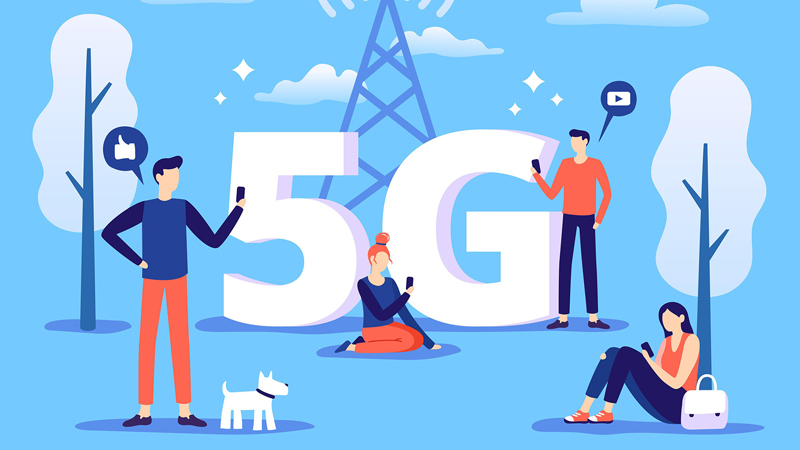If you think 5G technology is exaggerated, then you can wait for the arrival of 5.5G

If you think 5G technology is exaggerated, then you can wait for the arrival of 5.5G
According to a new survey, less than half of 5G users in the UK say 5G's speed or reliability has improved compared to 4G.

The survey was conducted by comparison service Uswitch and came from a sample of 2,000 users in the UK. The company said that more than 16 million people in the UK now have 5G phones, but have mixed experiences with the network. While some felt their network service had improved, only 41% of 5G users reported an improvement in 5G speed or reliability.
There is also a digital divide between urban and rural users. Some rural users say they have never connected to a 5G network despite having a 5G-enabled phone. According to Uswitch's survey, 17% of rural users with 5G mobile phones have never used 5G service, compared with 6% in cities.
Additionally, 1 in 6 mobile users believe 5G technology is overhyped. This is perhaps not surprising, as the technology is relatively early in deployment and is being compared to more mature 4G networks.
5G is still in its early stages
In fact, in the case of the UK, 5G services are still provided by connecting 5G antennas to the same network infrastructure used by existing 4G services. But many of 5G's key benefits and capabilities—such as ultra-low latency, extremely high data rates, or the ability to support more devices than 4G—can only be achieved by upgrading or retrofitting infrastructure.
"After 5G promises super-fast speeds for our phones, many consumers still don't understand how adopting 5G is different from their day-to-day experience," said Ernest Doku, a telecoms expert at Uswitch, noting that 5G should be able to deliver 20Gbps Top speeds, and while consumers are unlikely to experience such speeds in practice, tests have shown that 5G can be at least 20 times faster than 4G networks. In fact, the technology is still in its infancy in the UK.
Gartner principal analyst Bill Menezes agrees. "As operators continue to update their networks with 5G technology, users will increasingly experience the improvements in speed or reliability that 5G promises," he said. "But it will take some time. The full rollout of a new generation of mobile technology typically takes three to five years. 5 years, and the rollout of 5G technology is just over two years away.”
CCS Insight analyst Kester Mann agrees, saying: "There is no doubt that 5G has so far struggled to meet the extremely high expectations set by the telecom industry. This may be the case when the technology is more widely adopted by enterprises. That will change, but there is still a lack of new apps and services specifically for the consumer market."
PP Foresight analyst Paolo Pescatore believes that given the growing importance of internet connectivity to the home, many consumers are placing more value on home broadband connections. "It's clear that some users are not interested in 5G because the 4G network still meets their needs," he said. "Fundamentally, users want robust and reliable connectivity everywhere."
Towards 5.5G
Meanwhile, some vendors are already looking beyond 5G.
In his speech at the 2022 Global Mobile Broadband Forum held recently, Wang Tao, executive director of Huawei, praised the advantages of 5.5G and urged industry insiders to prepare for "moving towards 5.5G". He said that 5.5G networks can provide a 10Gbps experience, support the connection of hundreds of billions of mobile devices, and help realize native intelligence.
Wang Tao pointed out that in order to achieve this goal, the mobile industry first needs to develop standards. Huawei and other companies need to work together to ensure that 3GPP Release 18 is completed as planned by the first quarter of 2024.
Some things about 5.5G sound familiar, like its need to use millimeter-wave frequencies. Wang Tao also said, "If operators want to achieve a 10Gbps experience, they need to obtain more than 800MHz of spectrum from this frequency band."
However, 6GHz is also considered as a potential frequency band for 5.5G, which could cause problems in countries like the US, as the entire 6GHz band is already available for unlicensed use and is already used by Wi-Fi6E, and subsequently Wi-Fi7 will also be use.
In this regard, Wang Tao added, "We can also adjust the spectrum below 6GHz to achieve the ultra-large bandwidth of 5.5G."
If you dig a little deeper, 3GPP Release 18 has already been labeled 5G Premium by companies like Nokia and Ericsson.
Pescatore believes that, "Given the situation of some manufacturers, this seems more like a marketing strategy." Menezes pointed out more bluntly, "As for 5.5G, this is an issue that suppliers want operators to pay attention to, and users can ignore it. it."